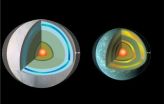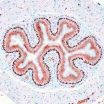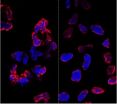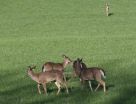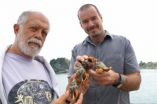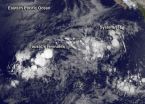(Press-News.org) Bacteria found in the bladders of healthy women differ from bacteria in women with a common form of incontinence, according to researchers from Loyola University Chicago Stritch School of Medicine.
These findings, published July 9, 2014, in the American Society for Microbiology's online journal mBio, suggest that bacterial communities may play a role in female urinary health.
"Urgency urinary incontinence (UUI) is a common, yet poorly understood, condition with symptoms similar to urinary tract infections," said Alan Wolfe, PhD, co-investigator and professor of Microbiology and Immunology. "If we can determine that certain bacteria cause UUI symptoms, we may be able to better identify those at risk for this condition and more effectively treat them."
Approximately 15 percent of women suffer from UUI and yet an estimated 40 – 50 percent do not respond to conventional treatments. One possible explanation for the lack of response to medication may be the bacteria present in these women.
This study evaluated urine specimens of 90 women with and without UUI symptoms. Samples were collected through a catheter and analyzed using an expanded quantitative urine culture (EQUC) technique. This technique was able to find bacteria that are not identified by the standard culture techniques typically used to diagnose urinary tract syndromes. This study also used 16S rDNA sequencing to classify bacterial DNA. The UUI and non-UUI urinary bacteria differed by group based on both culture type and sequence.
"These findings may have strong implications for the prevention, diagnosis and treatment of women with this form of incontinence," said Paul Schreckenberger, PhD, co-investigator and director, clinical microbiology laboratory, Loyola University Health System.
INFORMATION:
Bacteria found in bladders of healthy women differ from those in women with incontinence
2014-07-09
ELSE PRESS RELEASES FROM THIS DATE:
NASA finds friction from tides could help distant earths survive, and thrive
2014-07-09
As anybody who has started a campfire by rubbing sticks knows, friction generates heat. Now, computer modeling by NASA scientists shows that friction could be the key to survival for some distant Earth-sized planets traveling in dangerous orbits.
The findings are consistent with observations that Earth-sized planets appear to be very common in other star systems. Although heat can be a destructive force for some planets, the right amount of friction, and therefore heat, can be helpful and perhaps create conditions for habitability.
"We found some unexpected good news ...
NASA MESSENGER and STEREO measurements open new window into high-energy processes on the sun
2014-07-09
Understanding the sun from afar isn't easy. How do you figure out what powers solar flares – the intense bursts of radiation coming from the release of magnetic energy associated with sunspots – when you must rely on observing only the light and particles that make their way to near-Earth's orbit?
One answer: you get closer. NASA's MESSENGER spacecraft -- which orbits Mercury, and so is as close as 28 million miles from the sun versus Earth's 93 million miles -- is near enough to the sun to detect solar neutrons that are created in solar flares. The average lifetime for ...
New recreational travel model to help states stop firewood assisted insect travel
2014-07-09
RESEARCH TRIANGLE PARK, NC, July 9, 2014 – The spread of damaging invasive forest pests is only partially powered by the insects' own wings. People moving firewood for camping can hasten and widen the insects' spread and resulting forest destruction. A new U.S. Forest Service study gives state planners a tool for anticipating the most likely route of human-assisted spread they can use to enhance survey and public education efforts.
The study, "Using a Network Model to Assess Risk of Forest Pest Spread via Recreational Travel," was published July 9 in the journal PLOS ...
CNIO scientists discover that pluripotency factor NANOG is also active in adult organisms
2014-07-09
Scientists from the Spanish National Cancer Research Centre (CNIO) have discovered that NANOG, an essential gene for embryonic stem cells, also regulates cell division in stratified epithelia—those that form part of the epidermis of the skin or cover the oesophagus or the vagina—in adult organisms. According to the conclusions of the study, published in the journal Nature Communications, this factor could also play a role in the formation of tumours derived from stratified epithelia of the oesophagus and skin.
The pluripotency factor NANOG is active during just two days ...
No extra mutations in modified stem cells, study finds
2014-07-09
LA JOLLA-The ability to switch out one gene for another in a line of living stem cells has only crossed from science fiction to reality within this decade. As with any new technology, it brings with it both promise--the hope of fixing disease-causing genes in humans, for example--as well as questions and safety concerns. Now, Salk scientists have put one of those concerns to rest: using gene-editing techniques on stem cells doesn't increase the overall occurrence of mutations in the cells. The new results were published July 3 in the journal Cell Stem Cell.
"The ability ...
Hunting gives deer-damaged forests in state parks a shot at recovery
2014-07-09
WEST LAFAYETTE, Ind. - Regulated deer hunts in Indiana state parks have helped restore the health of forests suffering from decades of damage caused by overabundant populations of white-tailed deer, a Purdue study shows.
A research team led by Michael Jenkins, associate professor of forest ecology, found that a 17-year-long Indiana Department of Natural Resources policy of organizing hunts in state parks has successfully spurred the regrowth of native tree seedlings, herbs and wildflowers rendered scarce by browsing deer.
Jenkins said that while hunting may be unpopular ...
Protein pushes breast cancer cells to metastasize
2014-07-09
Using an innovative tool that captures heretofore hidden ways that cells are regulated, scientists at Rockefeller University have identified a protein that makes breast cancer cells more likely to metastasize.
What's more, the protein appears to trigger cancer's spread in part by blocking two other proteins that are normally linked to neurodegeneration, a finding that suggests these two disease processes could have unexpected ties.
The study, which appears in the July 10 issue of Nature, points to the possibility of new cancer therapies that target this "master regulator" ...
Not at home on the range
2014-07-09
As climate change shifts the geographic ranges in which animals can be found, concern mounts over the effect it has on their parasites. Does an increased range for a host mean new territory for its parasites as well?
Not necessarily, says a team of UC Santa Barbara scientists, including parasitologists Ryan Hechinger and Armand Kuris. In a study published in the Journal of Biogeography, Hechinger, Kuris and colleagues show that for some species, the opposite may happen: Hosts may actually lose their parasites when the hosts shift or increase their range. Theirs is one ...
New system would give individuals more control over shared digital data
2014-07-09
Cellphone metadata has been in the news quite a bit lately, but the National Security Agency isn't the only organization that collects information about people's online behavior. Newly downloaded cellphone apps routinely ask to access your location information, your address book, or other apps, and of course, websites like Amazon or Netflix track your browsing history in the interest of making personalized recommendations.
At the same time, a host of recent studies have demonstrated that it's shockingly easy to identify unnamed individuals in supposedly "anonymized" data ...
NASA, NOAA satellites help confirm Tropical Storm Fausto as a remnant low
2014-07-09
NOAA's GOES-West and NASA-JAXA's Global Precipitation Measurement or GPM mission satellite helped forecasters at the National Hurricane Center determine that what was once Tropical Storm Fausto is now a remnant area of low pressure in the Eastern Pacific Ocean.
Forecaster Beven at the National Hurricane Center (NHC) noted that "satellite imagery, overnight scatterometer data, and a recent GPM satellite microwave overpass indicate that Fausto has degenerated to a trough of low pressure."
On July 9 at 1500 UTC (11 a.m. EDT) Fausto's circulation was no longer apparent ...
